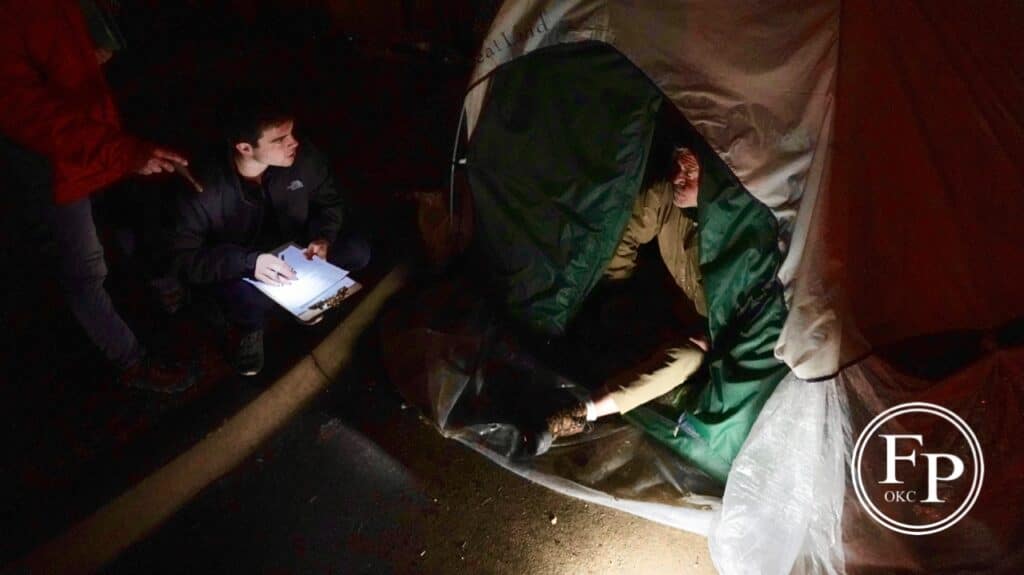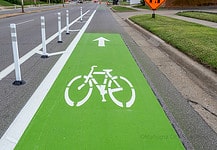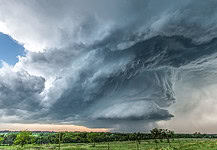Last Updated on August 6, 2023, 2:52 AM | Published: November 18, 2022
OKLAHOMA CITY — (UPDATED) — The City Council of Oklahoma City will have a first hearing on two new proposed ordinances that give sweeping new powers to police to arrest transients, people with no homes, and activists.
The agenda item asks for a public hearing on December 6 and a final hearing on January 3, 2023.
Mark Stonecipher, City Councilor for Ward 8 on the far north side of the City, asked Municipal Counselor Kenneth Jordan to fashion the new ordinances that dramatically tighten trespassing laws on both public and private lands, as well as tightening the definitions of public disturbances including during a public meeting. Ward 1 Councilor Bradley Carter and Ward 4 Councilor Todd Stone have also signed on to be sponsors of the proposal.
One of the two proposed ordinances details what an “encampment” is for the purposes of outlawing the types of camping that homeless persons engage in throughout the city in tents and other temporary lodgings.
Council member comments
Attempts to reach Stonecipher by cell phone and by email Friday afternoon were unsuccessful.
But, in a letter to other Council members circulated earlier in the week, Stonecipher cited “shootings” in homeless camps as prompting “a growing number of complaints about trespassing and encampments.”
In the letter, he cited both Houston and San Diego as examples of cities that have developed new approaches to homelessness. Stonecipher also quoted a former mayor of San Diego at the top of the letter:
“Former San Diego Mayor Kevin Faulconer noted, ‘Conventional wisdom and academic theories on how to solve homelessness have proven to be largely ineffective.’
Ward 6 Councilor JoBeth Hamon responded to our request for comment.
“I fear if this ordinance passes, we will end up in a lawsuit on which we’ll spend money to defend that could have been more effectively used to address the root causes that lead to people camping on public or private property in our city,” wrote Hamon to Free Press in a text message.
The City Council has made attempts in the past to address the visibility of homeless persons with a panhandling ordinance that lost in the courts, eventually costing the City nearly a million dollars:
Hamon wrote that about a year ago the city had allocated around $1 million to “a handful of initiatives – one of which was to address recommendations from our Strategic Plan to Address Homelessness” but had only recently started spending the money.
“Creating new and increased penalties that only displace people instead of engage them and connect them to services and housing is not an effective way to address homelessness and the effects of concentrated poverty,” wrote Hamon.
Trespass
The proposed new trespassing ordinance heavily amends current trespassing laws and makes it easier for police to arrest those who are on public lands, in public buildings, and even public school lands or buildings.
- Twelve new types of “public disturbances” are defined in the trespass ordinance.
- Some disturbances are defined to make shouting or using loud “unusual” noises illegal.
- One of the defined prohibited activities could be easily used to arrest those who are protesting in a public meeting on public property by “disrupting any lawful assembly or meeting of persons without lawful authority.”
- Simply being in a public building without expressed permission of the agency or owner could subject one to arrest.
This is the proposed ordinance as attached to the agenda for Tuesday:
Prop-Trespass-Ordinance‘Encampment‘
One of the ways that persons without homes survive, especially in the winter months, is to camp in open spaces not currently being used.
Many churches and individuals gather tents and other camping equipment to hand out to homeless persons to help with their survival year round.
The proposed ordinance about “encampment” would:
- Prohibit materials commonly used by homeless persons to build shelter.
- Prohibit the use of a “heating device.”
- Prohibit camping in any “public place” owned by cities, the county, a public school district, the State of Oklahoma, or the Federal government.
Public places where camping would not be allowed would include places to which the public has access:
- Public rights-of-way,
- Public parks,
- Public streets,
- Public sidewalks,
- Public hiking trails,
- Public biking trails,
- Public transit facilities,
- Public bridges,
- Public underpasses,
- Public parking lots.
This is the whole proposed new ordinance that is attached to the agenda for Tuesday:
Prop-Encampment-OrdinanceFounder, publisher, and editor of Oklahoma City Free Press. Brett continues to contribute reports and photography to this site as he runs the business.










